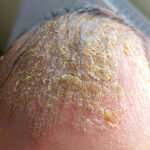11 Weird But Normal Things About Newborns

Let me say this for the umpteenth time: parenting does not come with a user guide. All those classes and books on how to hold your breath during labor, manage fetal hiccups, and so much more are a gamble. These “hacks” may work or backfire dearly.
After delivery, I have everything figured out. That’s right, until…
This article is a compilation of 11 weird but normal things about newborns that parents find disturbing. Let’s get into these weird but normal things about newborns.
Weird But Normal Things About Newborns
1. Awkward Groans
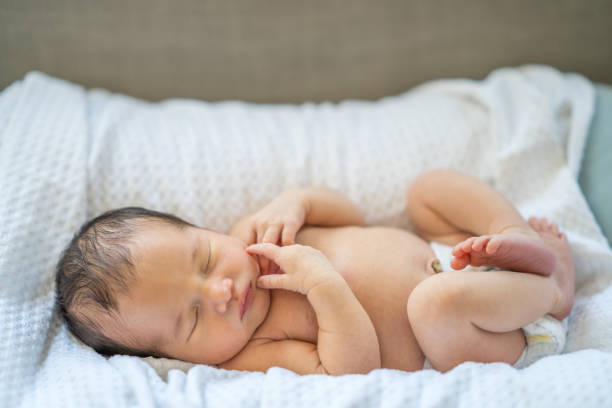
As a new parent, prepare to deal with random and awkward groans from your little munchkin(s). Have I ever told you how I nearly dropped my newborn son for cooing so loudly out of the blue? As a first-time dad, that was “abnormal”.
However weird it seems, it is normal for babies to make “not-so-pleasant noises”, commonly known as racketing. Babies coo, groan, grunt, and even sneeze randomly. The main reason why babies make these funny noises is because their nasal passages are narrow.
The narrow nasal passages in babies also cause mucus to get trapped inside, making the baby produce enhanced, unique sounds. You can clear the baby’s clogged nasal passages using a nasal aspirator.
When should I see a doctor?
If your baby grunts with every breath, see your pediatrician immediately.
2. Jerky Movements
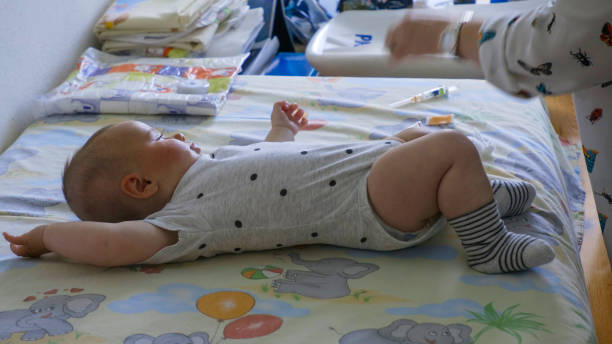
Another weird but normal thing about newborns is having random jerky movements. You might notice your baby’s feet and arms getting jerky and shaking uncontrollably, randomly. Why do babies get jerky movements? Jerky movements in babies mainly occur due to their developing startle reflex, scientifically known as the Moro reflex.
Loud noises might also trigger jerky movements in babies, making it hard for them to sleep soundly.
One of the best techniques to reduce the jerky movements in babies is swaddling them. In this article, I tackle the benefits of swaddling your baby.
Should you seek medical help when your baby is jerky?
Every normal baby gets jerky movements from time to time. The only time you should seek medical help is when your baby does not exhibit any jerky movements.
3. Explosive Poop
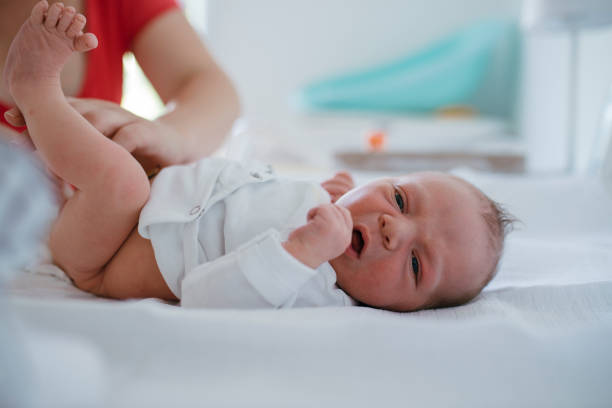
When it comes to giving surprises, babies are unmatched. Babies have a habit of spraying you with random pee… and poo!
You will also realize that your baby won’t shoot that explosive poop until you have taken off their diaper, which is a weird habit.
If you are wondering why a baby’s poop is so thin, here is the reason. Babies exclusively consume fluids, which remain in that state after digestion.
Did I tell you how my son sprayed my wife with a generous serving of the yellow poop during a diaper change? Eww?
Should I see a doctor when my baby gets an explosive poop?
If your baby’s poop is yellow, brown, or dark and is watery with seedy particles, there is no cause for alarm. However, if the poop is bloody, talk to your pediatrician immediately.
4. Constant Sneezing
Another weird but normal thing about newborns is constant sneezing. When babies (just like adults in a new environment) come into this world, it takes time for them to adjust.

Babies are extra sensitive to everything: the air we breathe, the weather, perfumes, and almost anything that comes across their olfactory organs.
Babies sneeze when an unwelcome guest gets to the nasal passages, irritants or particles.
Your baby will also sneeze when you take them out to sunbathe or tuck them in heavy blankets. Newborns might sneeze frequently to release any amniotic fluid stuck in their nasal passages.
Should I see a doctor when my baby sneezes constantly?
If your baby produces a wheezing sound after sneezing, take them for tests by your pediatrician. They could be battling an allergy or another ailment that needs special medical attention.
5. Cradle Cap
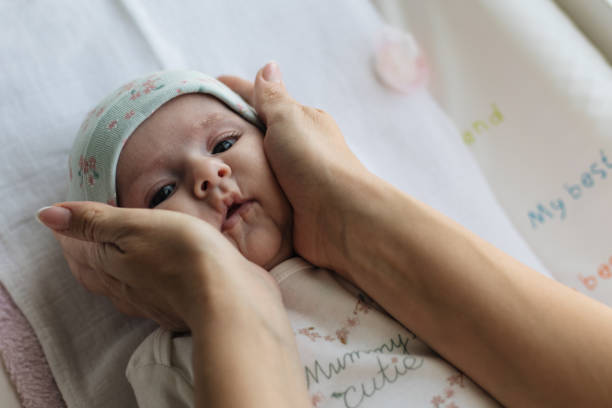
I have discussed the issue of cradle cap two times in my previous articles. I discussed the causes and treatment for cradle cap and dandruff. Read the two articles to understand that cradle cap is normal for babies and should never give you sleepless nights.
6. Hiccups
What does your local myth say about hiccups in babies? Hiccups form part of the weird but normal things that babies do, leaving their parents worried for their safety. Hiccups in babies start when they are still unborn and continue months after birth.
Hiccups in newborn babies mainly occur due to spasms in the diaphragm and are normal.
7. Baby Boobs
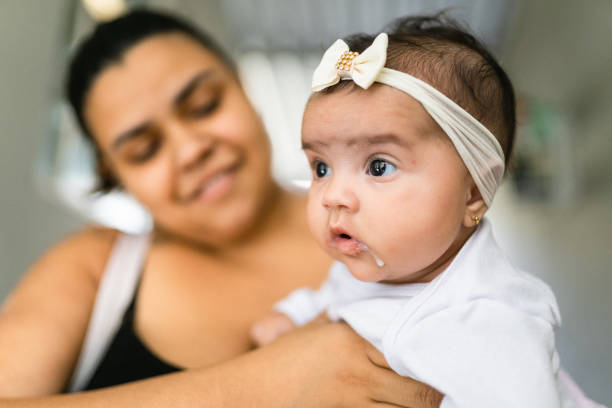
As a mother, you cannot forget the freaking hormones that made you crave weird things, cry for no good reason, and gain or lose so much weight.
Did you know that you transfer the same hormones to your baby, making them grow… wait for it… baby boobies?
When you transfer the hormones to your baby, they make them grow breasts, like a lady’s. However, the pregnancy hormone-induced boobs in babies go away with time and should not worry you.
Should you seek medical help if your baby has big boobs?
If the baby shows any redness around the breasts, take them for a check-up. You should also take the baby for a check-up if their baby boobs are accompanied by temperature off the ceiling.
8. Swollen Genitals

It is weird but normal for newborn boys to have testes larger than what you might consider normal.
There are two possible causes for this phenomenon. First, the exposure to your hormones before birth might make the tests grow big. Second, some fluid might build up in the sac around the testicles. Don’t worry; your baby’s testicles will regain their normal size after a few days.
The same condition is also common among baby girls. Their labia might appear puffy or swollen a few days after birth. The same condition might be caused by fluid build-up or the raging hormones.
Should you seek medical help if your baby’s genitals are swollen?
If your baby’s genitals, especially a boy, do not reduce in size after a week, seek medical assistance. Baby boys are prone to developing a condition called hydrocele, which might take a long time to correct if not treated.
9. Crossed Eyes

It is weirdly normal for babies to have crossed eyes. After all, your baby is used to the dark environment inside the womb and is trying to adjust. It takes about 2-4 months for their eyes to adjust to the external environment, during which they appear crossed.
Another reason why a baby’s eyes appear crossed is due to the shape of their face. Newborn babies have an extra skin layer covering some white parts of the eyes, which might make them appear cross-eyed.
When should you be worried? If the baby still appears cross-eyed after six months, consult your pediatrician for further tests. If both eyes appear to be crossing each other in different directions, the baby could be having strabismus. On the other hand, if only one eye appears rogue, they could have amblyopia, commonly known as lazy eye.
10. Blood in the Diaper
What would cross your mind if you spotted blood in your baby’s diaper? You would freak out, no?
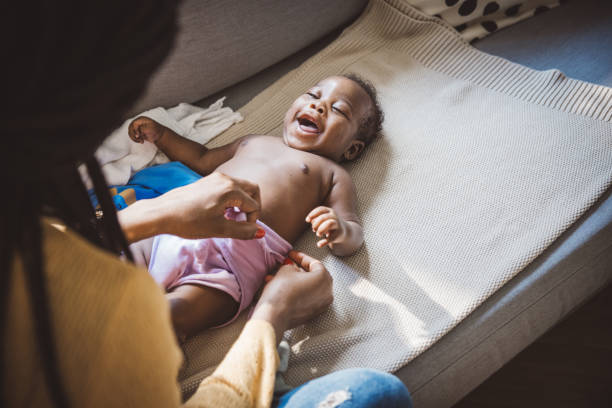
The truth is, blood in your baby’s diaper should not be a cause for alarm until you have established the exact cause. These are the possible reasons why your baby might be having blood in the diaper.
During pregnancy, high estrogen levels might be passed on to baby girls. After delivery, the baby girl might experience withdrawal symptoms of the estrogen hormone, which include “mini periods”. Mini-periods should not worry you since they clear after a few days.
If you had had your baby boy circumcised, the healing wound might get a scratch, resulting in bleeding.
The final reason that could make your baby’s diaper have blood is extreme rash on their bottoms. In the case of extreme diaper rash, the baby will cry or appear fussy.
11. “Oddly” Shaped Heads
The final weird but normal thing in newborns is having an “abnormal” head shape. How does it happen?
Babies’ heads are delicate and so soft. During delivery, the narrow cervix and birth canal might be a bit hard on the baby’s head, often squeezing it as the baby pushes their way through.
The constant squeezing during delivery might cause the baby to develop “oddly” shaped heads. You might notice your baby having soft spots or having some flat sides.
Another cause of the oddly shaped head is their sleeping position. When a newborn sleeps in one position, that side tends to flatten.
You can reshape the baby’s head by changing their sleeping position, holding them in your arms, and alternating where you place their toys.
Should I get concerned if my baby’s head is odd?
See a doctor if these tips on controlling flat heads in babies fail to work. The doctor might advise you to put the baby on a temporary helmet to correct their head shape. The best time to put your baby on the head-shaping mask is 4-6 months.

